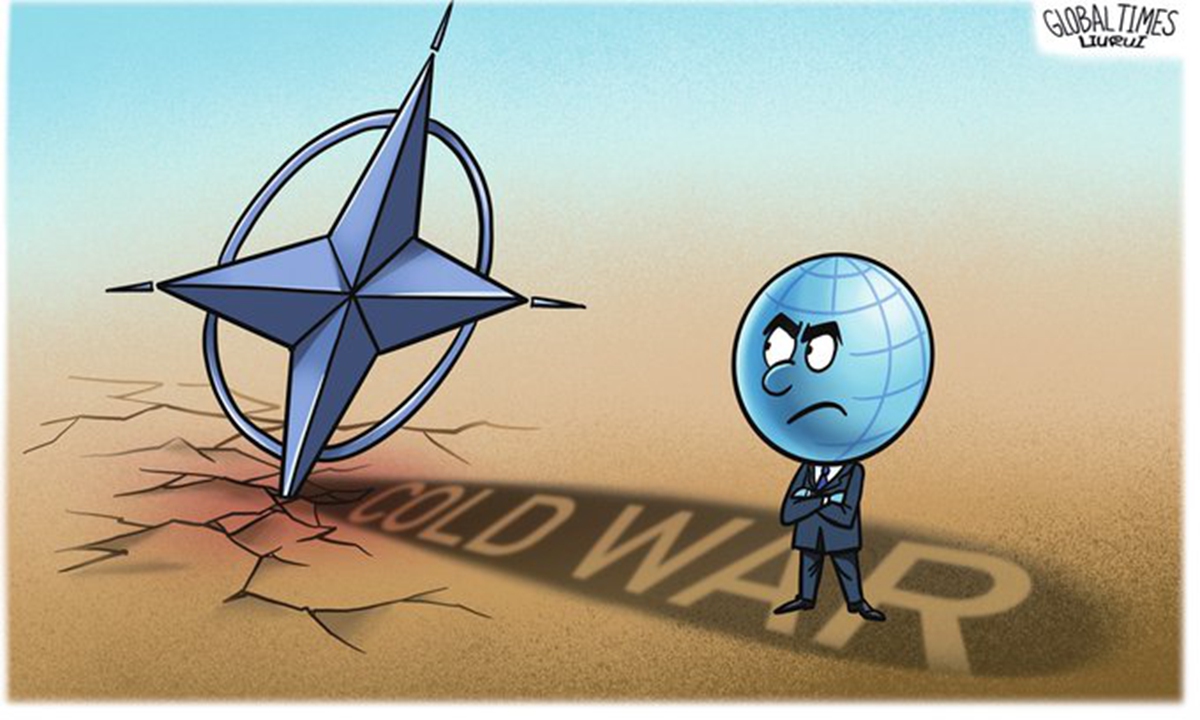
Illustration: Liu Rui/Global Times
Outgoing NATO Secretary General Jens Stoltenberg boasted of his achievements during his tenure in his farewell speech on Thursday, claiming that in 10 years, the number of NATO soldiers on its eastern flank increased from zero to tens of thousands, the number of troops on high readiness rose from thousands to half a million, and the number of its allies spending at least 2 percent of GDP on defense increased from three to 23. Montenegro, North Macedonia, Finland and Sweden joined the alliance, deepening their relations with countries in the "Indo-Pacific region." Stoltenberg also summarized five lessons that are key to NATO's continued "success" in the future, urging the US and Europe not to engage in isolationism, declaring that "freedom is more important than free trade" and NATO "must not make the same mistake with China" as they did with Russia.
In the context of the ongoing poor European security situation, Stoltenberg's self-boasting is somewhat like "taking the wrong script." However, when reviewing Stoltenberg's 10-year term, NATO's "expansion" indeed stands out as a central theme. In addition to the points he mentioned in his speech, statistics showed that NATO's military spending had increased by over 30 percent during his tenure, reaching a record $1.185 trillion in 2024. As a transatlantic military alliance, NATO also saw strategic, geographical, and content-based expansion under Stoltenberg's leadership. Not only did it label China as a "systemic challenge," repeatedly hyping up the "China threat" and accelerating NATO's "Asia-Pacificization," but it also incorporated issues like supply chains, technological and economic security into its agenda.
The key question is, apart from self-proclaiming NATO as being "strong, united and more important than ever," what exactly have these expansions brought to the world? How much of the 30 percent increase in military spending has flowed into the pockets of the US military-industrial complex, how much security anxiety has been spread around the world, and how much of it has been at the expense of the livelihoods, well-being and social stability of Europe. Is it safer or less safe for NATO countries to provoke confrontation with China by following the US' China strategy? Is it weal or woe to securitize and weaponize the industrial chain, supply chain, cyberspace and other fields, and inject NATO-style confrontational mentality into areas that could have healthy cooperation and interaction?
If we are to give a more serious and thorough assessment of Stoltenberg's past decade in office, these are issues that cannot be ignored, and the answers are quite the opposite of the achievements he highlighted. With Europe now facing such a precarious security situation, what responsibility does NATO bear?
It was NATO's expansion that sowed the seeds of the Ukraine crisis, and its extension into the Asia-Pacific region has exported geopolitical tensions beyond Europe. Under Stoltenberg's leadership, NATO has further aligned itself with US strategic goals, and all of NATO's shifts reflected US strategic intentions. The historical evaluation of Stoltenberg, beyond being the second longest serving NATO secretary general due to internal divisions within the alliance, will likely include his image as a "loyal executor" of Washington's policies and its "vanguard."
NATO should have ended with the Cold War, its survival and development have always relied on creating security anxieties and engaging in conflicts, repeatedly. On one hand, NATO claims to be a regional alliance, but on the other hand, under the guise of ensuring its own security, it continuously expands globally. It claims to be a defensive organization, yet in the name of defense, it promotes deterrence and stirs confrontation. Stoltenberg attempts to portray NATO as a protector of regional and even global security, but the rhetoric that "military strength is a prerequisite for dialogue" is merely another way of saying "Might makes right."
On the surface, this speech looks much like a smug war readiness declaration left by Stoltenberg to NATO, but in fact, the words between the lines cannot hide NATO's own dilemma and loss. Amid domestic political uncertainty in the US, what will the future of NATO be and where will Europe's sustainable security lie? Behind Stoltenberg, European countries and the world are left with a more divided situation.
Actually, NATO's 75-year history has proven that it has not made Europe or the world more peaceful and secure. The existence and continuous expansion of NATO have become the root cause of security dilemmas. On the contrary, "long peace" has been achieved in places with less NATO intervention and confrontational mentality. The value of Stoltenberg's farewell speech and the expansion of NATO he boasted about lies in telling the world that the current world does not need a NATO that provokes camp confrontation and spreads a Cold War mentality, let alone a globally expanding NATO. We urge NATO to "retire" together with its outgoing secretary general, alongside the outdated concepts of Cold War mentality and zero-sum game, the wrong practices of advocating military force and pursuing "absolute security," and dangerous behaviors that disrupt Europe and the Asia Pacific as soon as possible.




